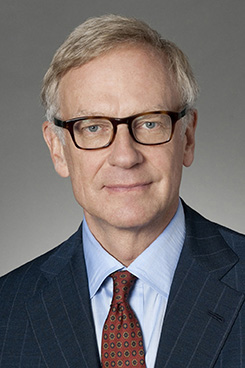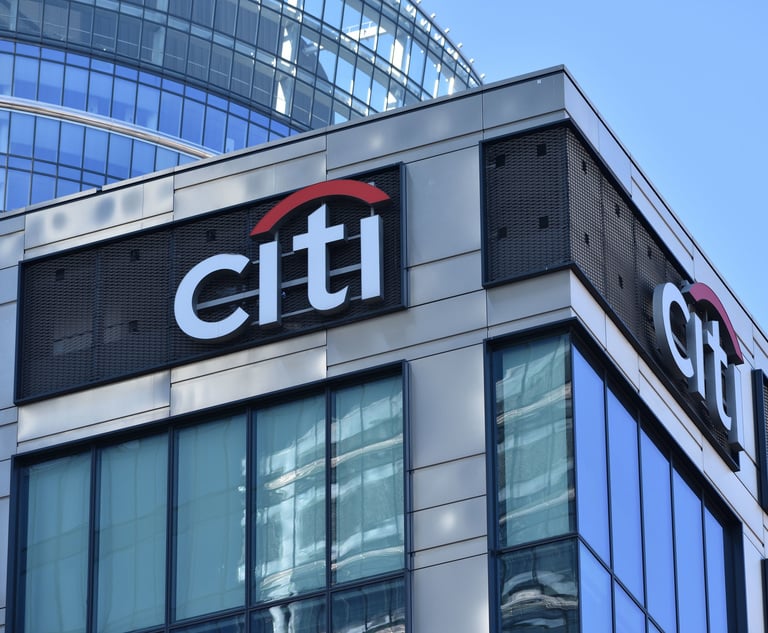Milberg Claims Firm Cheated Out of $12M Fee in Argentine Bond Case
The firm said it was fired shortly before it should have received a major contingency fee from a group of European investors who sued Argentina for defaulting on its sovereign debt.
May 08, 2019 at 05:36 PM
5 minute read
 Stacks of 100 Argentine pesos. (Photo: Diego Giudice/Bloomberg)
Stacks of 100 Argentine pesos. (Photo: Diego Giudice/Bloomberg)
The plaintiffs firm Milberg has sued a group of European investors that it previously represented in years of Argentina bond litigation, alleging the investors fired the law firm to avoid paying an $11.9 million fee.
In the suit filed Monday, the New York firm is asking a federal judge to throw out an arbitral award that left Milberg with a mere $87,000.
 Michael Spencer of Milberg
Michael Spencer of MilbergAccording to Milberg's suit, filed in Manhattan federal court, money manager Hans Wilhelm Brand fired the firm shortly after receiving a $162 million settlement offer from Argentina and learning that Milberg would be entitled to an $11.9 million contingency fee if he accepted. People and entities whose money Brand managed, called the HWB investors, switched lawyers and reached a nearly identical settlement a year later, according to Milberg's suit against the investors.
Milberg said it initiated arbitration against the HWB investors in 2017 seeking legal fees, but received a stunning decision from a three-man disputes panel in February 2019 that found the investors' payments to Milberg and its other lawyers, totaling $513,000, was sufficient. The neutrals at the International Centre for Dispute Resolution acknowledged Milberg had done more work for the HWB group than the firm's billing records might indicate, but said “qualitative considerations have their limitations,” and said no further fees were merited.
“Anyone with passing familiarity with complex litigation prosecuted on a contingency fee basis … would be shocked to learn that a hard-fought case lasting well over a decade, which resulted in a settlement recovery by plaintiffs of $162 million, could end with an award of fees to plaintiffs' counsel of zero,” the law firm said in its petition Monday. (The firm was paid $87,000 before the arbitration over legal fees began.)
Documents Milberg filed in its suit indicate that it took over the HWB entities' claims from Marc Dreier by 2010, after Dreier admitted to orchestrating a massive investment fraud scheme and his law firm failed. The clients had previously paid $110,000 to Dreier and around $300,000 to Argentine lawyer Patricia Rosito Vago and her nonlawyer husband, the arbitral award said in a footnote.
Michael Spencer was the lead Milberg lawyer on the Argentine bond cases, according to the arbitral award, and the firm said the HWB group was its biggest Argentine bonds client. Milberg received between $5 million and $5.5 million from other clients for its work on those cases, the award said.
The arbitrators noted that Milberg clocked 172 attorney hours and 90 paralegal hours on the HWB entities' cases, worth $142,900, but spent “more time on the representation of HWB than is reflected in its HWB-specific time records.” Still, the panel declined to award Milberg any more than it had been paid, saying the $513,000 the HWB investors had paid to all their lawyers was “a reasonable total fee recovery.”
In its lawsuit, Milberg, which reorganized in 2018 and now does business through the firm Milberg Tadler Phillips Grossman, argued that the award should be vacated because it showed manifest disregard for the law.
After firing Milberg, the award said, the HWB clients hired the firm Wilk Auslander to go to bat for them; that firm was paid $1.6 million after billing $2.3 million, according to the award. Milberg argued that Wilk Auslander failed to secure a better settlement than Argentina offered in 2016 through its bond dispute settlement program known as the “propuesta.”
But Wilk Auslander partner Jay Auslander, a lawyer for HWB investors, said in an interview that Milberg had ridden the coattails of other law firms whose clients held much greater amounts of Argentine bonds. It was those firms that did the heavy lifting, he said, not Milberg.
“That [Milberg] caused the propuesta is, in our view, absurd,” he said in the interview. “We had a highly qualified, highly experienced three-lawyer panel that had a very high level of juridical sophistication and heard a tremendous amount of evidence. … We believe their award will not reasonably be challenged.”
William Dahill, a Wollmuth Maher & Deutsch partner who represents Milberg, declined to comment, as did Spencer, who is listed as of counsel on the website of Milberg Tadler.
The lawsuit, and the possibility that Milberg may forego nearly $12 million in fees, comes amid other recent litigation reflecting significant financial pressure on the law firm.
Steven Schulman and David Bershad, former partners at a Milberg predecessor firm who were sent to prison for their role in a corruption scandal, have both sued Milberg and Milberg Tadler in New York state court in the last few months for allegedly failing to pay amounts due to them under various agreements with Milberg. They said Milberg Tadler lawyers have said Milberg simply doesn't have the funds to pay them, but the ex-partners argue that Milberg Tadler can be held liable.
Bershad said in a letter filed in late April that settlement talks are ongoing.
Leslie Corwin of the law firm Eisner, who represents Schulman, declined Wednesday to state whether the same was true for his client. “We hope they're successful in this thing because we've got an interest in it,” Corwin said about Milberg's suit against HWB investors.
This content has been archived. It is available through our partners, LexisNexis® and Bloomberg Law.
To view this content, please continue to their sites.
Not a Lexis Subscriber?
Subscribe Now
Not a Bloomberg Law Subscriber?
Subscribe Now
NOT FOR REPRINT
© 2025 ALM Global, LLC, All Rights Reserved. Request academic re-use from www.copyright.com. All other uses, submit a request to [email protected]. For more information visit Asset & Logo Licensing.
You Might Like
View All
New York-Based Skadden Team Joins White & Case Group in Mexico City for Citigroup Demerger

Bankruptcy Judge Clears Path for Recovery in High-Profile Crypto Failure
3 minute read
US Judge Dismisses Lawsuit Brought Under NYC Gender Violence Law, Ruling Claims Barred Under State Measure
Trending Stories
Who Got The Work
J. Brugh Lower of Gibbons has entered an appearance for industrial equipment supplier Devco Corporation in a pending trademark infringement lawsuit. The suit, accusing the defendant of selling knock-off Graco products, was filed Dec. 18 in New Jersey District Court by Rivkin Radler on behalf of Graco Inc. and Graco Minnesota. The case, assigned to U.S. District Judge Zahid N. Quraishi, is 3:24-cv-11294, Graco Inc. et al v. Devco Corporation.
Who Got The Work
Rebecca Maller-Stein and Kent A. Yalowitz of Arnold & Porter Kaye Scholer have entered their appearances for Hanaco Venture Capital and its executives, Lior Prosor and David Frankel, in a pending securities lawsuit. The action, filed on Dec. 24 in New York Southern District Court by Zell, Aron & Co. on behalf of Goldeneye Advisors, accuses the defendants of negligently and fraudulently managing the plaintiff's $1 million investment. The case, assigned to U.S. District Judge Vernon S. Broderick, is 1:24-cv-09918, Goldeneye Advisors, LLC v. Hanaco Venture Capital, Ltd. et al.
Who Got The Work
Attorneys from A&O Shearman has stepped in as defense counsel for Toronto-Dominion Bank and other defendants in a pending securities class action. The suit, filed Dec. 11 in New York Southern District Court by Bleichmar Fonti & Auld, accuses the defendants of concealing the bank's 'pervasive' deficiencies in regards to its compliance with the Bank Secrecy Act and the quality of its anti-money laundering controls. The case, assigned to U.S. District Judge Arun Subramanian, is 1:24-cv-09445, Gonzalez v. The Toronto-Dominion Bank et al.
Who Got The Work
Crown Castle International, a Pennsylvania company providing shared communications infrastructure, has turned to Luke D. Wolf of Gordon Rees Scully Mansukhani to fend off a pending breach-of-contract lawsuit. The court action, filed Nov. 25 in Michigan Eastern District Court by Hooper Hathaway PC on behalf of The Town Residences LLC, accuses Crown Castle of failing to transfer approximately $30,000 in utility payments from T-Mobile in breach of a roof-top lease and assignment agreement. The case, assigned to U.S. District Judge Susan K. Declercq, is 2:24-cv-13131, The Town Residences LLC v. T-Mobile US, Inc. et al.
Who Got The Work
Wilfred P. Coronato and Daniel M. Schwartz of McCarter & English have stepped in as defense counsel to Electrolux Home Products Inc. in a pending product liability lawsuit. The court action, filed Nov. 26 in New York Eastern District Court by Poulos Lopiccolo PC and Nagel Rice LLP on behalf of David Stern, alleges that the defendant's refrigerators’ drawers and shelving repeatedly break and fall apart within months after purchase. The case, assigned to U.S. District Judge Joan M. Azrack, is 2:24-cv-08204, Stern v. Electrolux Home Products, Inc.
Featured Firms
Law Offices of Gary Martin Hays & Associates, P.C.
(470) 294-1674
Law Offices of Mark E. Salomone
(857) 444-6468
Smith & Hassler
(713) 739-1250







